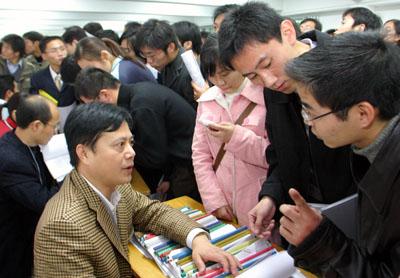


(file photo)
To compete with first-tier cities, second-tier cities put forward a series of preferential policies to attract and retain some of China’s seven million fresh graduates.
About 7.5 million graduates rush into society as graduation season comes. When first-tier cites, such as Beijing and Shanghai, tighten resident requirements, second-tier cities launch special policies to retain the millions of graduates, and encourage their employment and entrepreneurship in these cities.
In the last week, some provincial capitals, including Wuhan, Changsha, Xi'an, and Chengdu, continuously announced their future investment plans to attract the graduates, for example, the policy that allows the granting of household registration before employment.
Wuhan and Xi'an have lowered their requirements for resident registration to the lowest level ever among provincial capitals.
According to policy in Changsha, the capital of central China's Hunan province even provides rewards for fresh graduates, in addition to zero requirements for Hukou (resident registration). The city said it would provide new graduates registered in it with rental and housing subsidies based on their degrees. Graduates with doctor, master, and bachelor degrees can get 15K, 10K, and 6K RMB as rental allowance, respectively; and for those who buy their first homes, 60K and 30K RMB will be given as housing allowance to PhD graduates and postgraduates, respectively.
Besides household registration and cash subsidies, housing is also taken into the consideration in this talent contest. Nanjing and Chengdu provide “talent apartments” and public rental houses to graduates working locally. In Chengdu, it was just announced that outside graduates could check into the “youth talent hotel” for free for seven days.
The talent contest is actually due to the tightening policy of first-tier cities, such as Beijing and Shanghai. The quota for people from other places to register their household in Beijing has been decreasing since 2014, and the population in Shanghai has seen nagative growth since 2015. Among the first-tier cities, only Shenzhen in southern China has kept its talent policy in place.
Second-tier cities realize that talents are significant to their development, so attracting them is just the first step. To retain them, outstanding industries and recourses are the crux. For example, Changsha’s superior entertainment industry attracts media folks, but the Internet and science and technology industries are developing. A report from Lanzhou University showed that second-tier cities are less appealing to graduates than first-tier ones in the areas of Internet, finance, and media.
Actually, for the talents, housing, household registration, and allowances are not the most important factors for deciding whether to settle down in a new place. The key is the development potential.
 Fire brigade in Shanghai holds group wedding
Fire brigade in Shanghai holds group wedding Tourists enjoy ice sculptures in Datan Town, north China
Tourists enjoy ice sculptures in Datan Town, north China Sunset scenery of Dayan Pagoda in Xi'an
Sunset scenery of Dayan Pagoda in Xi'an Tourists have fun at scenic spot in Nanlong Town, NW China
Tourists have fun at scenic spot in Nanlong Town, NW China Harbin attracts tourists by making best use of ice in winter
Harbin attracts tourists by making best use of ice in winter In pics: FIS Alpine Ski Women's World Cup Slalom
In pics: FIS Alpine Ski Women's World Cup Slalom Black-necked cranes rest at reservoir in Lhunzhub County, Lhasa
Black-necked cranes rest at reservoir in Lhunzhub County, Lhasa China's FAST telescope will be available to foreign scientists in April
China's FAST telescope will be available to foreign scientists in April "She power" plays indispensable role in poverty alleviation
"She power" plays indispensable role in poverty alleviation Top 10 world news events of People's Daily in 2020
Top 10 world news events of People's Daily in 2020 Top 10 China news events of People's Daily in 2020
Top 10 China news events of People's Daily in 2020 Top 10 media buzzwords of 2020
Top 10 media buzzwords of 2020 Year-ender:10 major tourism stories of 2020
Year-ender:10 major tourism stories of 2020 No interference in Venezuelan issues
No interference in Venezuelan issues
 Biz prepares for trade spat
Biz prepares for trade spat
 Broadcasting Continent
Broadcasting Continent Australia wins Chinese CEOs as US loses
Australia wins Chinese CEOs as US loses